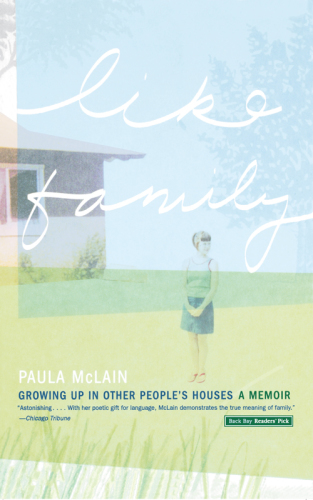
Like Family
Growing Up in Other People's Houses, a Memoir
کتاب های مرتبط
- اطلاعات
- نقد و بررسی
- دیدگاه کاربران
نقد و بررسی

January 20, 2003
The teenage years are trying for many, but they're downright hellish for those abandoned by their parents and shuffled from foster home to foster home. Such is the painfully obvious message of McLain's memoir. Sparing no harsh details, McLain recounts the 15-year span during the 1970s and early '80s when she and her sisters endured all sorts of hardships at the hand of so-called parents, even including sexual and physical abuse. The girls never felt accepted by or connected to anyone, and these identity conflicts only amplified their normal teenage insecurities. McLain has won recognition for her poetry from the NEA and with a grant from the Academy of American Poets for her first book, Less of Her. She displays her poetic inclinations with florid descriptions of every person and place she encountered and concrete illustrations of her feelings. Recalling the first uncomfortable moment upon entering the first strange house as an eight-year-old, she writes, "the distance between the door and the couch seemed vast and unnavigable, like the distance between Baretta
and dinner, evening and morning, tomorrow and next week. We sat down." Although McLain's constant embellishments and fixation on superfluous character development detract from a consistent narrative thread, this is a brave account, evidently cathartic for the author and occasionally difficult for the reader. Agent, Leigh Feldman. (Mar. 18)Forecast:Little, Brown is positioning this book as "a real-life
White Oleander." It probably will resonate among the Oprah crowd, if it can rise above the current deluge of women's memoirs.

November 15, 2002
A real-life White Oleander: McLain's 14 years in foster care.
Copyright 2002 Library Journal, LLC Used with permission.

February 1, 2003
McLain was only four when her mother left to go to the movies with her boyfriend and never came back. McLarin and her two sisters, Theresa and Penny, moved from their grandmother's house to their father's sister's and then to foster care until their father could get the means together to raise them. They lived with two families before their father came to claim them. He took them home to live with his new wife, Donna, and their children, but when he landed in jail for the second time, the girls were sent back to foster care. They finally ended up with the Linberghs--Bub, Hilde, and their daughter, Tina. The endless shuttling from family to family ended, but the girls still felt alone. Hilde was cold and distant; Bub was affectionate until the girls hit puberty, and then a little too affectionate; and Tina was spoiled and bossy. When McLain was 20, something unexpected and startling happened: her mother resurfaced. Observant and yet somewhat guarded, McLain has written a straightforward and moving memoir.(Reprinted with permission of Booklist, copyright 2003, American Library Association.)

























دیدگاه کاربران